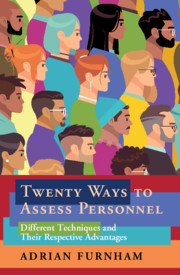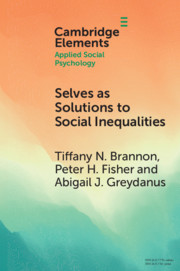Refine search
Actions for selected content:
23 results
‘What helps to eat well?’: Self-perceived strengths to support people in improving their dietary habits
-
- Journal:
- Proceedings of the Nutrition Society / Volume 84 / Issue OCE2 / June 2025
- Published online by Cambridge University Press:
- 24 July 2025, E154
-
- Article
-
- You have access
- Export citation
16 - The Many Paths of Development
- from Section III - Adolescence
-
- Book:
- Child Development
- Published online:
- 19 June 2025
- Print publication:
- 12 June 2025, pp 239-258
-
- Chapter
- Export citation
Building Employee Engagement and Resilience Through Strengths-Based Leadership
-
- Journal:
- The Spanish Journal of Psychology / Volume 27 / 2024
- Published online by Cambridge University Press:
- 25 October 2024, e25
-
- Article
-
- You have access
- Open access
- HTML
- Export citation
1 - Introduction
- from Part I
-
- Book:
- Succeeding and Adult Dyslexia
- Published online:
- 11 January 2024
- Print publication:
- 01 February 2024, pp 3-24
-
- Chapter
- Export citation
Cultural contributions to adults' self-rated mental health problems and strengths: 7 culture clusters, 28 societies, 16 906 adults
-
- Journal:
- Psychological Medicine / Volume 53 / Issue 16 / December 2023
- Published online by Cambridge University Press:
- 19 May 2023, pp. 7581-7590
-
- Article
- Export citation
Dysregulation profile in children of ethnoracially diverse at-risk families: Factor structure and longitudinal correlates
-
- Journal:
- Development and Psychopathology / Volume 36 / Issue 2 / May 2024
- Published online by Cambridge University Press:
- 27 February 2023, pp. 787-798
-
- Article
-
- You have access
- Open access
- HTML
- Export citation
Chapter 1 - Introduction to Case Study Research
-
- Book:
- Combining Case Study Designs for Theory Building
- Published online:
- 02 February 2023
- Print publication:
- 09 February 2023, pp 1-9
-
- Chapter
- Export citation
The longitudinal interplay between insecure attachment behaviors and psychosocial strengths among children in child welfare services
-
- Journal:
- Development and Psychopathology / Volume 36 / Issue 2 / May 2024
- Published online by Cambridge University Press:
- 06 February 2023, pp. 578-588
-
- Article
-
- You have access
- Open access
- HTML
- Export citation
13 - Building Resilience and Strength
- from Part 2 - Strengthening Relationships with Children and Young People and Giving Support
-
- Book:
- A Guide to the Mental Health of Children and Young People
- Published online:
- 27 October 2022
- Print publication:
- 03 November 2022, pp 201-204
-
- Chapter
- Export citation
Chapter 2 - Understanding Your Personality as a Leader
-
- Book:
- Successful Leadership in Academic Medicine
- Published online:
- 20 May 2022
- Print publication:
- 19 May 2022, pp 10-21
-
- Chapter
- Export citation
4 - Self-Report Tests
-
- Book:
- Twenty Ways to Assess Personnel
- Published online:
- 11 June 2021
- Print publication:
- 01 July 2021, pp 115-206
-
- Chapter
- Export citation
Chapter 10 - Mattering in the Community
- from Part V - Community
-
- Book:
- How People Matter
- Published online:
- 20 May 2021
- Print publication:
- 17 June 2021, pp 219-242
-
- Chapter
- Export citation

Twenty Ways to Assess Personnel
- Different Techniques and their Respective Advantages
-
- Published online:
- 11 June 2021
- Print publication:
- 01 July 2021

Selves as Solutions to Social Inequalities
- Why Engaging the Full Complexity of Social Identities is Critical to Addressing Disparities
-
- Published online:
- 14 September 2020
- Print publication:
- 08 October 2020
-
- Element
- Export citation
10 - Leading teams, coaching and mentoring
-
- Book:
- Leadership
- Published online:
- 16 April 2019
- Print publication:
- 17 September 2018, pp 254-279
-
- Chapter
- Export citation
The Path of Emotional Least Resistance: Developing Theory Based on the Self-Reported Strengths of Happy and Distressed Couples in the Marriage Checkup
-
- Journal:
- Journal of Relationships Research / Volume 9 / 2018
- Published online by Cambridge University Press:
- 17 April 2018, e5
- Print publication:
- 2018
-
- Article
- Export citation
A Pilot Evaluation of a Strengths-Based CBT Intervention Module with College Students
-
- Journal:
- Behavioural and Cognitive Psychotherapy / Volume 45 / Issue 4 / July 2017
- Published online by Cambridge University Press:
- 28 March 2017, pp. 427-431
- Print publication:
- July 2017
-
- Article
- Export citation
Sustainability of organic food production: challenges and innovations
-
- Journal:
- Proceedings of the Nutrition Society / Volume 74 / Issue 1 / February 2015
- Published online by Cambridge University Press:
- 15 September 2014, pp. 83-88
-
- Article
-
- You have access
- HTML
- Export citation
Long-Term Care Planning Study: Strengths and Learning Needs of Nursing Staff*
-
- Journal:
- Canadian Journal on Aging / La Revue canadienne du vieillissement / Volume 25 / Issue 4 / Winter/Hiver 2006
- Published online by Cambridge University Press:
- 31 March 2010, pp. 347-361
-
- Article
- Export citation
The strengths and weaknesses of dietary survey methods in materially deprived households in England: a discussion paper
-
- Journal:
- Public Health Nutrition / Volume 12 / Issue 8 / August 2009
- Published online by Cambridge University Press:
- 01 August 2009, pp. 1157-1164
-
- Article
-
- You have access
- HTML
- Export citation
